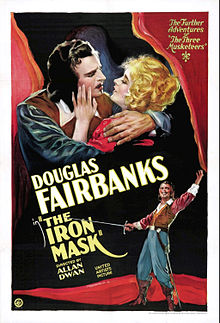The Iron Mask (1929 film)
| The Iron Mask | |
|---|---|
 |
|
| Directed by | Allan Dwan |
| Written by |
Jack Cunningham Alexandre Dumas (novel) Douglas Fairbanks |
| Starring |
Belle Bennett Douglas Fairbanks Marguerite De La Motte Dorothy Revier Vera Lewis Rolfe Sedan William Bakewell |
| Music by | Hugo Riesenfeld |
| Distributed by | United Artists |
|
Release date
|
|
|
Running time
|
95 minutes |
| Country | United States |
| Language |
part-talkie English intertitles |
| Box office | $1.5 million |
The Iron Mask is a 1929 American part-talkie adventure film directed by Allan Dwan. It is an adaptation of the last section of the novel The Vicomte de Bragelonne by Alexandre Dumas, père, which is itself based on the French legend of the Man in the Iron Mask.
The 1929 part-talkie version, titled The Iron Mask, was the first talking picture starring Douglas Fairbanks, though until recently it was usually shown in a silent version. The film stars Fairbanks as d'Artagnan, Marguerite De La Motte as his beloved Constance (who is killed early in the film to protect the secret that the King has a twin brother), Nigel De Brulier as the scheming Cardinal Richelieu, and Ullrich Haupt as the evil Count De Rochefort. William Bakewell appeared as the royal twins.
Fairbanks lavished resources on his final silent film, with the knowledge he was bidding farewell to his beloved genre. This marks the only time where Fairbanks's character dies at the end of the film, with the closing scene depicting the once-again youthful Musketeers all reunited in death, moving on (as the final title says) to find "greater adventure beyond".
The original 1929 release, though mostly a silent film, actually had a soundtrack: two short speeches delivered by Fairbanks, and a musical score with a few sound effects. In 1952, it was reissued, with the intertitles removed and a narration voiced by Douglas Fairbanks, Jr. added. The original film included a scene in which d'Artagnan tells the young King of an embarrassing adventure involving him and the three musketeers. The story is told in flashback but the 1952 version has it in chronological order with the scene with the King cut out.
...
Wikipedia
